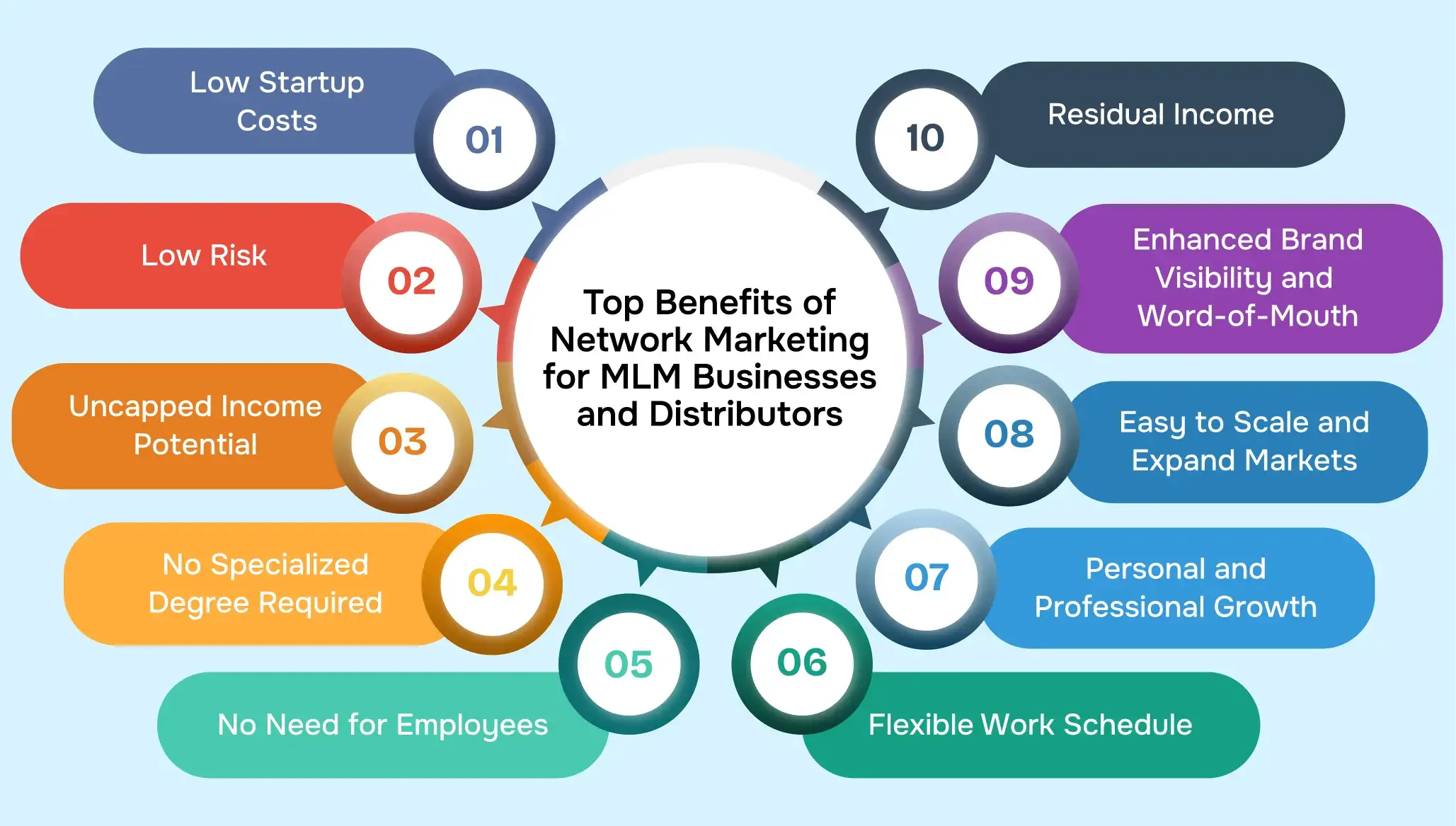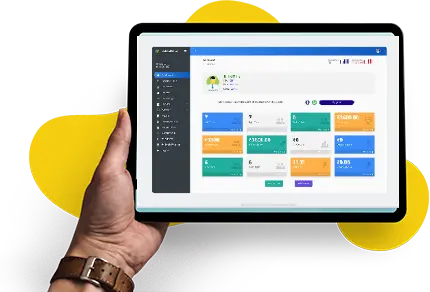Are you planning to start a network marketing business? Or do you want to join a multi-level marketing company and build a thriving career? In both cases, you’ll experience multiple benefits of network marketing.
A brand can benefit from low startup costs and easy scalability, while distributors can gain hands-on entrepreneurial experience. You can review the top direct selling benefits below and decide if this industry is right for you.
This Article Contains:
Why Network Marketing is Growing in 2026?
The network marketing industry is growing at a rapid pace, with a CAGR of 6.7% from 2025 to 2030. As per Grand View Research, the sector will be valued at USD 328.26 billion by 2030. The reasons behind this increasing growth are the factors such as:
As the market and consumer behavior evolve, the growth of network marketing also sees changes.
Top Benefits of Network Marketing for MLM Businesses and Distributors
Network marketing has numerous benefits, but at the top of the ladder are these:

1) Low Startup Costs (For Brands)
Launching a traditional business often demands heavy capital investment in infrastructure, staffing, inventory, and marketing. Network marketing reduces or removes many of these expenses.
An MLM brand operates through independent distributors who sell products directly to consumers. This eliminates the overhead tied to commercial real estate and extensive advertising campaigns.
For entrepreneurs creating an MLM brand, the entry threshold is much lower. Most costs are tied to product development, compliance, and platform setup rather than full-scale operational systems.
Once the structure is in place, distributors assume responsibility for reaching markets and generating sales. This allows companies to scale efficiently without burning resources in the early stages.
As a leading SaaS provider for MLM companies for decades, we have consistently observed how network marketing's low-cost entry empowers businesses to achieve sustainable growth by optimizing capital expenditure.
2) Low Risk (For Distributors)
Multi-level marketing mitigates financial exposure for distributors by shifting major fixed costs, such as warehousing and storefronts, onto the brand. They work on commission-based selling instead of salaried operations.
To start a business, most distributors only need a modest starter kit or a sample package. Then, they can sell directly through personal networks or digital channels, and scale expenses only as revenue justifies them.
This low upfront investment also limits risk factors, as there is no requirement to lease premises, hire overhead staff, or fund large inventory positions. Not just that, many MLM businesses have policies such as no inventory requirements (for example, Amway), inventory buyback guarantees, clear return windows, and digital order fulfillment.
Such policies further reduce the risks because distributors are not forced to carry unsold stock for prolonged periods. Training and mentorship from the upline compresses the learning curve, lowering operational mistakes that otherwise translate into financial loss.
Additionally, the low-risk profile is strengthened by modern MLM technology. E-commerce integrations, dropship options, subscription and auto-replenish models, and integrated payment/fulfillment platforms allow distributors to sell without physically holding the product.
There are social commerce tools and targeted analytics that can help distributors reduce wasted marketing spend by reaching receptive buyers more efficiently. Recurring revenue from subscriptions or repeat customers also smooths income volatility, turning occasional sales into predictable streams that make gradual reinvestment viable rather than risky.
3) Uncapped Income Potential (For Distributors)
Unlike salaried roles, network marketing removes a fixed upper limit on earnings. Distributors earn retail margin on their sales and commission overrides on the activity of teams they build. So income scales with both personal selling and network growth. This creates a possibility of earning passive income through an MLM business.
The MLM model creates leverage through duplication when a distributor trains others to sell; those replicated efforts generate overrides and rank-based bonuses that compound over time. Compensation plans add multiple income streams and generally have:
Together, these income streams allow committed distributors to convert time-limited effort into ongoing revenue. Plus, they get to benefit disproportionately from building effective teams and systems.
The upside is real but conditional; that’s why distributors need to work smartly to gain financial freedom in network marketing. An uncapped earning potential requires consistent sales, retention, recruitment, and leadership skills.
Furthermore, distributors need to verify whether a compensation plan is effective and whether the company's policies clearly disclose how quickly and reliably earnings grow. And while you’re at it, evaluate income-disclosure statements, rank advancement mechanics, churn/retention metrics, and any inventory or buyback rules before assuming the upside is attainable.
4) No Specialized Degree Required (For Distributors)
Network marketing lowers the barrier to entry by valuing demonstrable skills and on-the-job performance over formal academic credentials. The success of distributors and their teams is driven by the ability to communicate value, manage relationships, organize activity, and execute repeatable processes, rather than a diploma.
Distributors can use the company-supplied structured onboarding, modular training programs, sales playbooks, and practical simulations. These MLM resources can teach prospecting, closing, customer care, and basic business administration. Therefore, even a beginner with strong motivation and coachable habits can progress rapidly.
The MLM model accommodates people working part-time, looking to switch careers, housewives, and students. Their success progression is measured by concrete operational KPIs (sales conversions, active customers, team engagement, and rank milestones) rather than time-in-seat or prior degrees.
That makes network marketing a career where skill acquisition matters more than any conventional education. And the distributors can build transferable competencies in negotiation, personal branding, digital outreach, and team coordination that are marketable outside the industry.
Accessibility also widens talent pools, bringing diverse perspectives and lived experiences into sales channels. This allows merit-based advancement where performance, not pedigree, determines opportunity and reward.
5) No Need for Employees (For Distributors)
The distributors who scale a personal business within a network-marketing company can do so by building their teams. These are not paid employees; therefore, there’s no layer of administrative complexity. There is no payroll processing, employer-side social contributions, statutory leave administration, or benefits management tied to growth at the distributor level.
That reduces fixed operating overhead. It allows individual leaders to invest time in sales, coaching, and systemizing duplication instead of becoming HR managers. The variable-cost nature of a distributor’s organization, where compensation is tied to performance rather than salaried headcount, also makes rapid expansion financially manageable.
Additionally, MLM businesses utilize technology such as MLM software, which automates commission calculations, digital onboarding, and performance tracking for distributors. So a distributor can coordinate a sizable team without building an HR infrastructure.
6) Flexible Work Schedule (For Distributors)
Network marketing permits temporal autonomy. Distributors may set work hours around existing commitments, choose intensity levels that match personal capacity, and scale activity up or down without contractual penalties.
Distributors also gain operational flexibility, as most customer interactions shift to asynchronous channels, including messaging, scheduled posts, and automated order links. So, income-generating activity can be parcelled into short, focused sessions rather than contiguous workdays.
This makes working in MLM practical, allowing individuals to balance routine obligations while maintaining momentum through repeatable micro-tasks, such as:
For example, suppose you are a homemaker with school-run and caregiving duties. Your week might allocate mornings (let’s say 09:00 to 11:00) to outreach and order processing while children are at school. Then, an hour after lunch, you can manage content scheduling and customer messages. Further, you can host short online workshops or team calls two days a week.
Plus, you can set up automated funnels that’ll handle payment and fulfillment, so you do not need to be online constantly. This pattern converts limited free time into consistent business progress and preserves family responsibilities at the same time. And importantly, it lets growth be paced by capacity and choice rather than fixed employment hours.
7) Personal and Professional Growth (For Distributors)
Network marketing functions as a practical incubator for business skills, offering structured opportunities to learn by doing rather than by credentials. Distributors are supported by the MLM business with regular company-led modules and personality development events.
Many MLM coaches help distributors learn persuasive storytelling, customer retention techniques, basic financial tracking, digital audience building, and leading teams.
Typical skills acquired while building an MLM business include:
For the people without prior network marketing experience, the combination of these skills translates into accessible entrepreneurship through MLM. Distributors get to experience running a lean commercial operation on their own terms while earning.
8) Easy to Scale and Expand Markets (For Brands)
Scaling via network marketing leverages distributed human capital instead of fixed infrastructure. Recruiting local distributors externalizes customer acquisition, market research, and first-mile sales efforts.
Therefore, the network marketing company’s marginal cost of entering a new territory is largely limited to onboarding and product supply, rather than capital expenditures. Further, the distributors help the MLM business establish brand reputation as they’ve language fluency, cultural fit, and immediate trust within communities. This enables faster conversion and fewer failed rollouts compared to centrally created campaigns.
Because compensation is performance-based, the brand incurs significant marketing expenses only as it invests in its online presence to attract more distributors. Operationally, regional rollouts use existing fulfillment partners, dropship models, or distributor-managed inventory to avoid building warehouses and retail footprints.
Compliance and market nuances are handled more quickly through local partners who understand licensing, tax implications, and channel norms. Whereas standardized training programs and clear SOPs are provided to distributors in new territories to preserve brand consistency.
Finally, social media marketing used by both brands and distributors creates multiplier effects. The successful local teams generate referrals and social proof that accelerate adoption in adjacent areas, turning a small, controlled investment in people into rapid, cost-efficient geographic expansion.
9) Enhanced Brand Visibility and Word-of-Mouth (For Brands)
MLM enhances brand visibility by leveraging personal selling to generate trusted word-of-mouth publicity. Each distributor acts as a brand ambassador, extending reach through direct conversations and social networks that ads often miss.
MLM is essentially built on a personal selling method: one-to-one demos, referrals, small group presentations, and ongoing follow-ups. These touchpoints create credibility and familiarity, making recommendations feel authentic rather than promotional.
As distributors share experiences in their circles, both offline and on social platforms, the brand gains repeated exposure, social proof, and localized presence.
The factors that help a brand include:
10) Residual Income (For Distributors)
MLM compensation plans provide override commissions to the distributors. That means they can earn a percentage of sales made by their downline. This generates residual income, recurring as team members continue to sell.
Additionally, many brands, such as Amway, Herbalife, and LifeVantage, among others, offer subscription models. Therefore, when repeat customers reorder products, the distributors earn their commission automatically.
The MLM system allows distributors to earn beyond personal sales, converting network growth and customer retention into predictable, ongoing revenue streams.
Conclusion
Network marketing, as a business model, offers multiple benefits to both the brand and its distributors. The low upfront investment is a major benefit, while the support of distributors in scaling businesses to new territories remains monumental.
However, there’s one harsh truth that it requires hard work and resilience for both distributors and MLM companies to experience these benefits. Both must put in efforts to support each other, grow together, and enjoy the advantages of network marketing.
FAQs
1. Why is network marketing still relevant in 2026?
Network marketing remains relevant in 2026 because people prefer to buy products they can trust. In MLM, people share their experiences with a company's products with customers, which gives them personal approval of the quality, and customers trust it.
2. Is network marketing legal and safe in 2026?
Yes, network marketing is generally legal and safe in most countries as of 2026. However, it is recommended that you check the rules and regulations of the country you’re planning to start your MLM career in and make a decision based on that.
3. Do I need prior experience or business skills to succeed in network marketing?
No, you don’t need prior experience to start a network marketing career. Many MLM brands offer training and resources to distributors to learn essential skills. But, in the end, it depends on the hard work distributors put in to succeed.
4. What qualities do successful network marketers usually have?
The common traits successful network marketers have include:
Exceptional public speaking skills
Leadership mindset
Resilient and have a never-give-up nature
Fluent in interacting with customers
Self-motivated
Good at duplicating MLM systems
Excellent time management skills
Open to learning new tools, systems, and skills
5. How do digital tools and social media help in network marketing today?
Digital tools such as MLM commission software, lead generation software, and more help businesses streamline their processes. The repetitive tasks are automated using such tools, and the brand can spend more time on planning business expansion strategies. Similarly, social media helps both MLM brands and distributors in attracting customers and making sales.
Disclaimer: Global MLM Software does not endorse any companies or products mentioned in this article. The content is derived from publicly available resources and does not favor any specific organizations, individuals or products.







